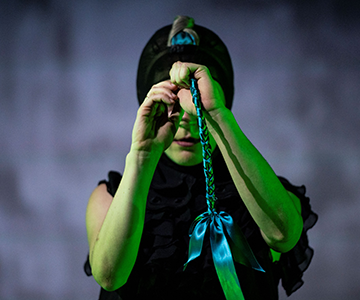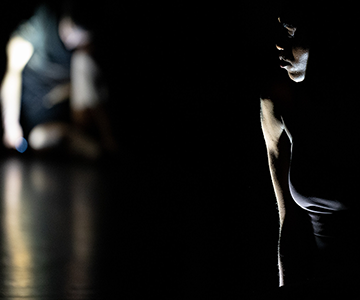
Alzheimat
Ioanna Portolou | Griffon Dance Company
ALZHEIMAT (Another Place)
The performance ALZHEIMAT (Another Place) focuses on the changes, moments of crisis, and coping strategies triggered by a dementia driven loss of identity – both for those who immediately suffer from the disease and for their social network. The performance is the result of an open working process: for several months, the author Kai Pichmann, the director Ron Rosenberg, and the choreographers Nikos Kalivas and Kosmas Kosmopoulos, together with nine to eleven performers – dancers and amateur actors over the age of 65 – explored the coexistence of remembering and forgetting, resistance, hope, resignation, and acceptance associated with the disease. Working with the experiences of relatives, caregivers, and medical experts played an important role in creating the performance.
Currently, nearly one and a half million elderly people in Germany are affected by dementia, primarily from the degenerative Alzheimer's variant. By 2050, this number is expected to double. For the foreseeable future, neither a cure nor a promising treatment of the symptoms seems possible. The suffering of the patients is multiplied by that of their relatives, while professional help through outpatient or – dignified – residential care is becoming increasingly difficult to realize or finance by the affected individuals, given the shortage of caregivers and the inaction of German politics regarding the urgently needed reform of the healthcare system.
With ALZHEIMAT (Another Place), we aim to draw attention to a topic of high societal and political relevance. However, the piece is not a criticism of system driven deficiencies, nor is it an emotional lament about the inevitable loss of a loved one. ALZHEIMAT (Another Place) is a journey of discovery that allows the audience to participate in the world of those who are on their way to another place, a place of oblivion. It is a story of beautiful and sad moments, as well as unexpected discoveries while dealing with the disease. Diary entries lead to awakening pasts and awaken dormant futures.
ALZHEIMAT (Another Place) questions a society fixated on a better tomorrow and reminds us that we have little more than the "here and now." The performance shows how fragile, vulnerable, interdependent, and reliant on each other we are as human beings are, but also that dementia sometimes offers an opportunity: to teach us how to be present in the moment. Last but not least, ALZHEIMAT (Another Place) aims to bring attention to all those who sacrifice themselves daily in the difficult task of dealing with the disease. The play seeks to stimulate an open discourse that allows the acknowledgment and expression of pain, exhaustion, and grief.
Cast & Crew
Play development and performance: Hedda Brandenburg, (Orfeas Chatzispirou), Sophia Gousgoula, Maia Joseph, Carmen Maria Jentzsch, (Jaewon Jung), (Lena Klink), Nikoleta Koutitsa, Davide Lorenzi, Jirmeja Pattianakotta, Ursula Schmidt-Bichler, Wolfgang Schuld, Caspar Sebastian Stuart, (Maria Tsouvala), (Agathe Vincent)
Artistic direction: Kosmas Kosmopoulos, Kai Pichmann, Ron Rosenberg
Concept and dramaturgy: Kai Pichmann
Theater direction: Ron Rosenberg
Choreography: Nikos Kalivas, Kosmas Kosmopoulos
Composition and music: Antonios Palaskas
Set design and costumes: Kosmas Kosmopoulos
Technical direction and lighting design: Andreas Harder, Sanja Gergoric, (Dimitris Stamatis)
Technical assistance: Eduard Mont de Palol
Production management and public relations: Fee Josten, Carmen Maria Jentzsch
Photography, Video and documentation: Giovanni Lo Curto
Production & Support
ALZHEIMAT (Another Place) is a production by LUNA PARK and Kai Pichmann, funded by the Performing Arts Fund with resources from the Commissioner of the Federal Government for Culture and Media as part of NEUSTART KULTUR.
ALZHEIMAT (Another Place) is realized in collaboration with the Gesundbrunnen Primary School within the artist residency program "tanz(t)räume" (dance rooms/ dreams) funded by TANZPAKT Stadt-Land-Bund (DANCE PACT Local-Regional-National) and the Berlin Senate Department for Culture and Social Cohesion, and in the frame of the project fund of QM Badstrasse.







